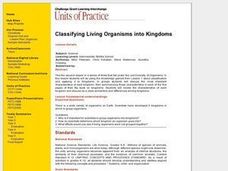Scholastic
Study Jams! The Kingdoms of Life
Life science learners discuss the characteristics of five kingdoms of life: animals, plants, fungi, protists, and bacteria in this video. Viewers find out from the dialogue that scientists group organisms according to similarities. This...
Scholastic
Study Jams! The Kingdoms of Life
Zoe and RJ discuss the way scientists classify organisms into five kingdoms. Characteristics of each group are highlighted within their conversation and with text. First-time taxonomists can view the animation at home, take the...
Curated OER
Five Kingdoms of Living Things
Fifth graders are introduced to the classification system used in Science. In groups, they explain the characteristics of each of the five kingdoms. After watching a video, they review the life processes of each kingdom and complete a...
Curated OER
Kingdom Animalia ~ A Look at the Five Major Classes
Biological taxonomy masters examine the five main classes under phylum chordata. Pupils compare and contrast the identifying characteristics of the various organisms. They explain why taxonomy is important in classifying organisms. You...
Curated OER
Naming New Species
Learners explore science of taxonomy and the Five Kingdoms of life,
categorize organisms into Kingdoms, and create multi-media presentations illustrating knowledge of a Kingdom. They collect data and related pictures on the Internet,...
Curated OER
Protists - The Protozoans
Five pages provide thorough coverage of three protozoans: euglena, amoebae, and paramecia. For each, junior biologists read factual text, label the organism, and write answers to several questions. This neatly organized assignment is...
Curated OER
Everything in Its Place: Science Classification
Students investigate the system of classification for living things through the sixteen lessons of this unit. The five kingdoms of monerans, protists, fungi, plants, and animals form the basis of several experiments as the similarities...
Virginia Department of Education
Classification of Organisms
Searching for the perfect indoor/outdoor activity that allows class members the opportunity to learn about organism classification? Here, pupils research organisms and categorize them according to domain and kingdom over the course of...
University of Hawaiʻi
Taxonomy and Me!
Taxonomy is the study of organisms and how you phylum. Three biology activities are included, helping scholars understand four of the six kingdoms, specifically Protista, Plantae, Fungi, and Animalia. Scholars observe and classify in...
Curated OER
The Kingdoms
Students review the various categories in taxonomy. In groups, they identify the characteristics of each kingdom and compare and contrast them. They define the terms binomial nomenclature and morphology. To end the lesson, they create...
Curated OER
AP: Chapter 26: Origin of Life
Five pages take biologists on a generalized survey of the origin of life. Queries are made regarding theories of how life developed, ancient Earth conditions, and the ever-changing field of taxonomy. The experiments of different...
Curated OER
To Group of Not to Group - That is the Question!
Upper elementary and middle schoolers use their observation skills to group different kinds of candy by similar characteristics. They debate whether or not we should classify objects. Finally, they learn that biologists have developed a...
Curated OER
Creative Classroom Creatures
Students are introduced to the five kingdoms and discover why there is a need for a classification system. Using the internet, they examine how scientific names are created and practice putting animals into their correct classification....
Curated OER
Classifying Living Organisms into Kingdoms
Learners create a flip book that describes the basic characteristics of the five main animal kingdoms. They research the animal kingdoms, include examples of organisms for each kingdom and illustrate the finished text.
Curated OER
Name that animal
A great way to classify organisms, is by counting the number of legs it has or how it moves. Little ones count the legs on five different creatures, then match the leg count to the proper animal name. Tip: Have them come up with other...
Curated OER
The Classification of the Kingdoms of Life
Students can learn about the evolution of science by discussing the classification of living things.
Curated OER
Investigating Animals in Soil
Students investigate and observe small animal activity on a plot of land on their school grounds. In small groups they identify the five kingdoms of animals, stake out a small plot of ground, collect samples, record and analyze any data...
Curated OER
Classification Number Two
A three-page quiz assessing budding biologists' understanding of classification. Middle-level learners may need a little additional time on this, but should be able to handle the concepts with ease.
Captain Planet Foundation
Which Plant Is Which?
Learn about dichotomous keys, plant identification, and how to care for the planet with a lesson plan that includes several hands-on and innovative activities. Kids go on a plant scavenger hunt and classify the plants that they find...
Casimir Middle School
Biological Classification Worksheet
Classify living things with a set of worksheets that has pupils sorting and indentifying living and non-living things. Learners use the worksheets as a basis for finding their answers.
Curated OER
Classification
Tenth graders explain how organisms are classified according to similarities. In this biology lesson, 10th graders research on five different organisms of their choice. They prepare a report and presentation about them which they share...
Curated OER
Classification of Organisms
For this classification worksheet, students solve 3 classification riddles, complete 6 true and false questions, complete 4 sequences, and solve a riddle about the classification of an animal.
University of Southern California
What Lives In The Ocean?
One of the most diverse environments on Earth is the ocean. Young scientists explore the living things found in the ocean during an exciting seven-lesson unit. Their study includes organisms from plankton to invertebrates and vertebrates...
Curated OER
The Three Worm Phyla
Ninth graders examine the three worm phyla. In this classification activity, 9th graders observe, compare and contrast the planarian, tapeworm, and fluke.
























